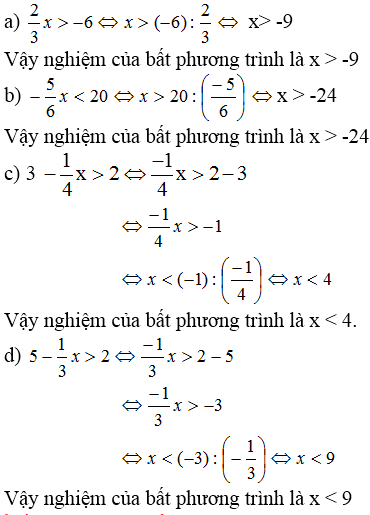Hãy nhập câu hỏi của bạn vào đây, nếu là tài khoản VIP, bạn sẽ được ưu tiên trả lời.

\(\dfrac{1.2}{1^2}.\dfrac{2.3}{2^2}.\dfrac{3.4}{3^2}...\dfrac{9.10}{9^2}.\dfrac{10.11}{10^2}\left(x-2\right)=-20\left(x+1\right)+60\)
\(\Leftrightarrow\dfrac{1.2^2.3^2.4^2...10^2.11}{1^2.2^2.3^2....10^2}\left(x-2\right)+20\left(x+1\right)=60\)
\(\Leftrightarrow11\left(x-2\right)+20\left(x+1\right)=60\)
\(\Leftrightarrow31x=62\)
\(\Rightarrow x=2\)

\(\dfrac{1.2}{1.1}.\dfrac{2.3}{2.2}.\dfrac{3.4}{3.3}.\dfrac{4.5}{4.4}...\dfrac{10.11}{10.10}\left(x-2\right)=-20x+40\)
\(\Leftrightarrow\dfrac{2.3.4...11}{1.2.3...10}\left(x-2\right)=-20x+40\)
\(\Leftrightarrow11\left(x-2\right)=-20x+40\)
\(\Leftrightarrow11x-22=-20x+40\)
\(\Leftrightarrow31x=62\)
\(\Rightarrow x=2\)
\(=>\dfrac{2\cdot1}{1\cdot1}\cdot\dfrac{2\cdot3}{2\cdot2}\cdot\dfrac{3\cdot4}{3\cdot3}\cdot......\cdot\dfrac{10\cdot11}{10\cdot10}\cdot\left(x-2\right)=-20\left(x+1\right)+60\)=>11*(x-2)=-20*(x+1)+60
=>11x-22=-20x-20+60
=>31x=62
=>x=2

a: \(\dfrac{1}{x^2+9x+20}+\dfrac{1}{x^2+11x+30}+\dfrac{1}{x^2+13x+42}=\dfrac{1}{18}\)
\(\Leftrightarrow\dfrac{1}{x+4}-\dfrac{1}{x+5}+\dfrac{1}{x+5}-\dfrac{1}{x+6}+\dfrac{1}{x+6}-\dfrac{1}{x+7}=\dfrac{1}{18}\)
=>\(\dfrac{x+7-x-4}{\left(x+4\right)\left(x+7\right)}=\dfrac{1}{18}\)
=>(x+4)(x+7)=54
=>x^2+11x+28-54=0
=>(x+13)(x-2)=0
=>x=-13 hoặc x=2
b: \(\Leftrightarrow\dfrac{1}{x+1}-\dfrac{1}{x+2}+\dfrac{1}{x+2}-...+\dfrac{1}{x+4}-\dfrac{1}{x+5}=\dfrac{1}{3}\)
=>\(\dfrac{x+5-x-1}{\left(x+5\right)\left(x+1\right)}=\dfrac{1}{3}\)
=>x^2+6x+5=12
=>x^2+6x-7=0
=>(x+7)(x-1)=0
=>x=-7 hoặc x=1

a: \(\Leftrightarrow\dfrac{x}{2\left(x+1\right)}-\dfrac{2x}{\left(x-3\right)\left(x+1\right)}=\dfrac{-x}{2\left(x-3\right)}\)
\(\Leftrightarrow x\left(x-3\right)-4x=-x\left(x+1\right)\)
\(\Leftrightarrow x^2-3x-4x+x^2+x=0\)
\(\Leftrightarrow2x^2-6x=0\)
=>2x(x-3)=0
=>x=0(nhận) hoặc x=3(loại)
b: \(\Leftrightarrow\dfrac{1}{\left(x+4\right)\left(x+5\right)}+\dfrac{1}{\left(x+5\right)\left(x+6\right)}+\dfrac{1}{\left(x+6\right)\left(x+7\right)}=\dfrac{1}{18}\)
\(\Leftrightarrow\dfrac{1}{x+4}-\dfrac{1}{x+5}+\dfrac{1}{x+5}-\dfrac{1}{x+6}+\dfrac{1}{x+6}-\dfrac{1}{x+7}=\dfrac{1}{18}\)
\(\Leftrightarrow\dfrac{1}{x+4}-\dfrac{1}{x+7}=\dfrac{1}{18}\)
\(\Leftrightarrow\dfrac{x+7-x-4}{\left(x+4\right)\left(x+7\right)}=\dfrac{1}{18}\)
\(\Leftrightarrow x^2+11x+28=54\)
\(\Leftrightarrow x^2+11x-26=0\)
\(\text{Δ}=11^2-4\cdot1\cdot\left(-26\right)=121+104=225>0\)
Do đó: Phương trình có hai nghiệm phân biệt là:
\(\left\{{}\begin{matrix}x_1=\dfrac{-11-15}{2}=\dfrac{-26}{2}=-13\\x_2=\dfrac{-11+15}{2}=\dfrac{4}{2}=2\end{matrix}\right.\)

\(\text{a) }\left|2-5x\right|=\left|3x+1\right|\\ \Leftrightarrow\left[{}\begin{matrix}2-5x=3x+1\\2-5x=-3x-1\end{matrix}\right. \Leftrightarrow\left[{}\begin{matrix}-5x-3x=1-2\\-5x+3x=-1-2\end{matrix}\right.\\ \Leftrightarrow\left[{}\begin{matrix}-8x=-1\\-2x=-3\end{matrix}\right.\Leftrightarrow\left[{}\begin{matrix}x=\dfrac{1}{8}\\x=\dfrac{3}{2}\end{matrix}\right.\)
Vậy tập nghiệm phương trình là \(S=\left\{\dfrac{1}{8};\dfrac{3}{2}\right\}\)
\(\text{b) }\dfrac{3}{4x-20}+\dfrac{15}{50-2x^2}+\dfrac{7}{6x+30}=0\)
ĐXKĐ của phương trình \(:x\ne\pm5\)
\(\text{Ta có }:\dfrac{3}{4x-20}+\dfrac{15}{50-2x^2}+\dfrac{7}{6x+30}=0\\ \Rightarrow\dfrac{3}{4\left(x-5\right)}+\dfrac{15}{2\left(25-x^2\right)}+\dfrac{7}{6\left(x+5\right)}=0\\ \Rightarrow\dfrac{3}{4\left(x-5\right)}-\dfrac{15}{2\left(x+5\right)\left(x-5\right)}+\dfrac{7}{6\left(x+5\right)}=0\\ \Rightarrow\dfrac{9\left(x+5\right)}{12\left(x+5\right)\left(x-5\right)}-\dfrac{90}{12\left(x+5\right)\left(x-5\right)}+\dfrac{14\left(x-5\right)}{12\left(x+5\right)\left(x-5\right)}=0\\ \Rightarrow9x+45-90+14x-70=0\\ \Leftrightarrow23x=115\\ \Leftrightarrow x=5\left(KTM\right)\)
Vậy phương trình vô nghiệm
\(\text{c) }\dfrac{x+29}{31}-\dfrac{x+27}{33}=\dfrac{x+17}{43}-\dfrac{x+15}{45}\\ \Leftrightarrow\left(\dfrac{x+29}{31}+1\right)-\left(\dfrac{x+27}{33}+1\right)=\left(\dfrac{x+17}{43}+1\right)-\left(\dfrac{x+15}{45}+1\right)\\ \Leftrightarrow\dfrac{x+60}{31}-\dfrac{x+60}{33}-\dfrac{x+60}{43}+\dfrac{x+60}{45}=0\\ \Leftrightarrow\left(x+60\right)\left(\dfrac{1}{31}-\dfrac{1}{33}-\dfrac{1}{43}+\dfrac{1}{45}\right)=0\\ \Leftrightarrow x+60=0\left(\text{Vì }\dfrac{1}{31}-\dfrac{1}{33}-\dfrac{1}{43}+\dfrac{1}{45}\ne0\right)\\ \Leftrightarrow x=-60\)
Vậy \(x=-60\) là nghiệm của phương trình

\(2x^4+3x^3+8x^2+6x+5=0\)
\(\Leftrightarrow2x^4+2x^3+2x^2+x^3+x^2+x+5x^2+5x+5=0\)
\(\Leftrightarrow2x^2\left(x^2+x+1\right)+x\left(x^2+x+1\right)+5\left(x^2+x+1\right)=0\)
\(\Leftrightarrow\left(x^2+x+1\right)\left(2x^2+x+5\right)=0\)
Mà \(x^2+x+1=\left(x+\frac{1}{2}\right)^2+\frac{3}{4}>0\forall x\)
\(2x^2+x+5=2\left[\left(x+\frac{1}{4}\right)^2+\frac{39}{16}\right]>0\forall x\)
Vậy tập nghiệm của pt là \(S=\varnothing\)
b, \(\frac{x-342}{15}+\frac{x-323}{17}+\frac{x-300}{19}+\frac{x-273}{21}=10\)
\(\Leftrightarrow\left(\frac{x-342}{15}-1\right)+\left(\frac{x-323}{17}-2\right)+\left(\frac{x-300}{19}-3\right)+\left(\frac{x-273}{21}-4\right)=0\)
\(\Leftrightarrow\frac{x-357}{15}+\frac{x-357}{17}+\frac{x-357}{19}+\frac{x-357}{21}=0\)
\(\Leftrightarrow\left(x-357\right)\left(\frac{1}{15}+\frac{1}{17}+\frac{1}{19}+\frac{1}{21}\right)=0\)
\(\Leftrightarrow x-357=0\Leftrightarrow x=357\)
Vậy tập nghiệm của pt: \(S=\left\{357\right\}\)

a) điều kiện xác định : \(x\ne0\)
ta có : \(A=\dfrac{x+1}{x^2+x+1}-\dfrac{x-1}{x^2-x+1}=\dfrac{3}{x\left(x^4+x^2+1\right)}\)
\(\Leftrightarrow A=\dfrac{\left(x+1\right)\left(x^2-x+1\right)-\left(x-1\right)\left(x^2+x+1\right)}{\left(x^2+x+1\right)\left(x^2-x+1\right)}=\dfrac{3}{x\left(x^4+x^2+1\right)}\)
\(\Leftrightarrow A=\dfrac{x^3-x^2+x+x^2-x+1-\left(x^3+x^2+x-x^2-x-1\right)}{x^4-x^3+x^2+x^3-x^2+x+x^2-x+1}=\dfrac{3}{x\left(x^4+x^2+1\right)}\) \(\Leftrightarrow A=\dfrac{x^3-x^2+x+x^2-x+1-x^3-x^2-x+x^2+x+1}{x^4+x^2+1}=\dfrac{3}{x\left(x^4+x^2+1\right)}\) \(\Leftrightarrow A=\dfrac{2}{x^4+x^2+1}=\dfrac{3}{x\left(x^4+x^2+1\right)}\Leftrightarrow\left(x^4+x^2+1\right)A=2=\dfrac{3}{x}\) \(\Leftrightarrow2x=3\Leftrightarrow x=\dfrac{3}{2}\left(tmđk\right)\) vậy \(x=\dfrac{3}{2}\)b) điều kiện : \(x\notin\left\{-4;-5;-6;-7\right\}\)
\(B=\dfrac{1}{x^2+9x+20}+\dfrac{1}{x^2+11x+30}+\dfrac{1}{x^2+13x+42}=\dfrac{1}{18}\)
\(\Leftrightarrow B=\dfrac{1}{\left(x+4\right)\left(x+5\right)}+\dfrac{1}{\left(x+5\right)\left(x+6\right)}+\dfrac{1}{\left(x+6\right)\left(x+7\right)}=\dfrac{1}{18}\)
\(\Leftrightarrow B=\dfrac{\left(x+6\right)\left(x+7\right)+\left(x+4\right)\left(x+7\right)+\left(x+4\right)\left(x+5\right)}{\left(x+4\right)\left(x+5\right)\left(x+6\right)\left(x+7\right)}=\dfrac{1}{18}\)
\(\Leftrightarrow B=\dfrac{x^2+13x+42+x^2+11x+28+x^2+9x+20}{\left(x+4\right)\left(x+5\right)\left(x+6\right)\left(x+7\right)}=\dfrac{1}{18}\)
\(\Leftrightarrow B=\dfrac{3x^2+33x+90}{\left(x+4\right)\left(x+5\right)\left(x+6\right)\left(x+7\right)}=\dfrac{1}{18}\) \(\Leftrightarrow B=\dfrac{3\left(x+5\right)\left(x+6\right)}{\left(x+4\right)\left(x+5\right)\left(x+6\right)\left(x+7\right)}=\dfrac{1}{18}\) \(\Leftrightarrow B=\dfrac{3}{\left(x+4\right)\left(x+7\right)}=\dfrac{1}{18}\) \(\Leftrightarrow54=\left(x+4\right)\left(x+7\right)\)\(\Leftrightarrow54=x^2+11x+28\Leftrightarrow x^2+11x+28-54=0\)
\(\Leftrightarrow x^2+11x-26=0\Leftrightarrow\left(x-2\right)\left(x+13\right)=0\)
\(\Leftrightarrow\left[{}\begin{matrix}x-2=0\\x+13=0\end{matrix}\right.\) \(\Leftrightarrow\left[{}\begin{matrix}x=2\\x=-13\end{matrix}\right.\left(tmđk\right)\)
vậy \(x=2;x=-13\)

-90
\(\dfrac{10-x}{100}\) + \(\dfrac{20-x}{110}\)+\(\dfrac{30-x}{120}\)=3
<=> \(\dfrac{10-x}{100}\)-1+\(\dfrac{20-x}{110}\)-1+\(\dfrac{30-x}{120}\)-1 = 0
<=> \(\dfrac{-x-90}{100}\)+\(\dfrac{-x-90}{110}\)+\(\dfrac{-x-90}{120}\)=0
<=> (-x-90) ( \(\dfrac{1}{100}\)+\(\dfrac{1}{110}\)+\(\dfrac{1}{120}\))=0
<=> (-x-90) = 0 ( do 1/100 +1/110+1/120 khác 0)
<=> -x-90 = 0
<=> -x = 90
<=> x =-90
Vậy nghiệm của pt là x=-90